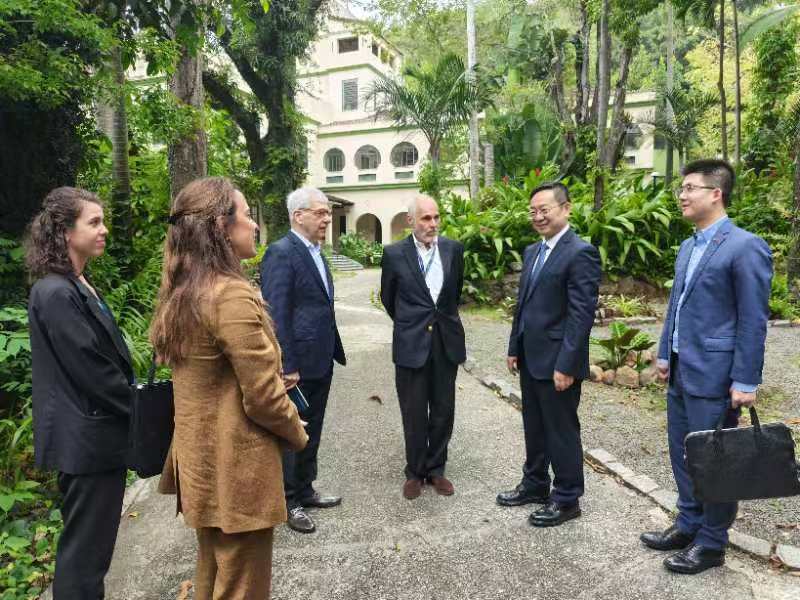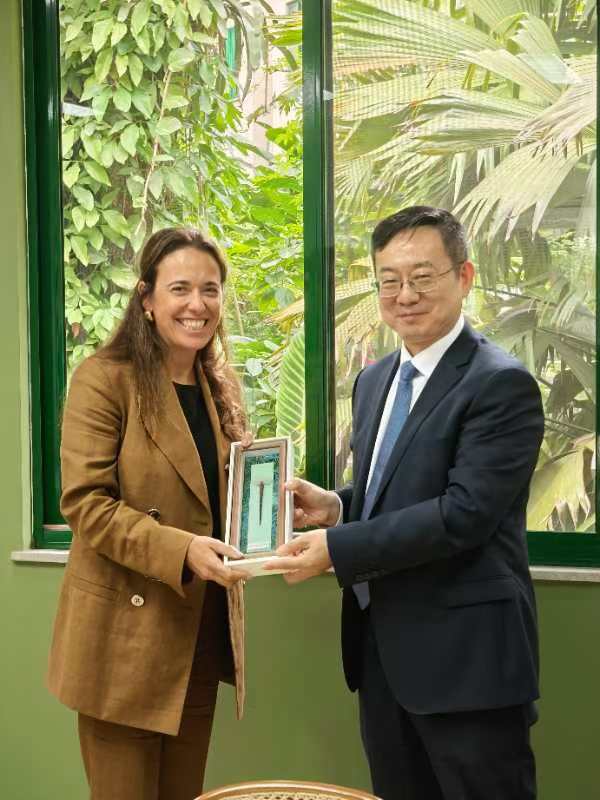


Gao Xiang leads CASS delegation to visit CEBRI
The G20 Leaders’ Summit is scheduled for November 18 and 19, 2024, in Rio de Janeiro, Brazil, where the Think 20 (T20) , which aims to build a high-level think tank network, will continue to provide intellectual support for the G20 dialogue. On October 14, local time , Gao Xiang, president of the Chinese Academy of Social Sciences (CASS), led a delegation to visit the Brazilian Center for International Relations (CEBRI) , the lead think tank for the T20 Brazil, where in-depth exchanges were held with its CEO, Julia Dias Leite.

Gao Xiang, president of CASS, speaking with Julia Dias Leite (second from left), CEO of CEBRI, and Marcos Caramuru (third from left), a member of the International Advisory Board of CEBRI, former Ambassador of Brazil to China and Malaysia, as well as former Consul General in Shanghai, October 14 Photo: Yang Xue/CSSN
Gao Xiang first expressed his appreciation for CEBRI’s significant contributions to the preparatory work for the T20 Summit. The two sides have maintained close communication within the T20 framework, achieving fruitful cooperation.
Gao Xiang emphasized that CASS is currently focused on research related to the Chinese path to modernization, global civilizational exchange and mutual learning, and common prosperity for all. As a country with a rich and complex history, China cannot simply replicate Western development models. Therefore, CASS has established the National Academy of Chinese Modernization (NACM), which is presently China’s highest-level and most competent research institution dedicated to the theory and practice of Chinese modernization. Exploring how to achieve common prosperity in the process of modernization is also an important task for CASS. Ending poverty is a global challenge, and China’s experience may provide useful insights for other countries and regions.
Regarding future cooperation, Gao Xiang proposed several specific directions: conducting joint research on crucial topics such as energy transition, poverty alleviation, and global governance and producing policy reports in order to provide constructive solutions to the reform of the global governance system; jointly organizing academic seminars and forums on significant international issues, inviting experts and scholars from around the world to participate, and creating a platform for global exchange; enhancing exchanges and visits between Chinese and Brazilian scholars, particularly young scholars, to provide intellectual support for accomplishing the development goals of the two countries as well as building prosperous and stable bilateral relations; and promoting in-depth exchange through book exchanges, joint publications, and intertranslation of academic literature to diversify research cooperation and people-to-people exchange between China and Brazil.

Gao Xiang, president of CASS, presenting a gift to Julia Dias Leite, CEO of CEBRI Photo: Yang Xue/CSSN
Julia Dias Leite warmly welcomed the visit of the CASS delegation, stressing that CEBRI values its friendly relationship with Chinese counterparts and aspires to further deepen cooperation between the two sides. Ms. Leite highlighted the extensive opportunities for collaboration and shared interests between Brazil and China in areas such as climate change, energy transition and sustainable development, technological transformation, and global governance, expressing hope for enhancing mutual understanding and collaboration on these critical issues through deepened exchange. Ms. Leite also voiced strong agreement with Gao Xiang’s proposals to strengthen visits and exchanges among young scholars, and looks forward to more diverse and enriched academic exchange activities between the two sides.
Editor:Yu Hui
Copyright©2023 CSSN All Rights Reserved